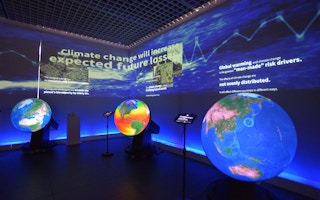UN chiefs want to transform the world by putting nature back at the heart of global decision-making, arguing that the global economic shutdown triggered by the Covid-19 pandemic is an opportunity to change the planet for the better: for a stable climate, for cleaner air and water, and for a richer natural environment, thanks to the UN survival plan.
The goal? A more sustainable and more equitable world by 2030, a carbon-neutral world by 2050, a curb on global pollution and waste and a halt to ever-accelerating rates of wildlife extinction worldwide.
The methods? One of the first, in Making Peace With Nature, the new United Nations Environment Programme report, will be to incorporate what conservationists call “natural capital” into measures of national economic performance.
That is because forests, savannahs, wetlands and other natural habitats represent wealth, and their loss accelerates poverty.
If nations and regions can reverse environmental decline then they can at the same time advance the alleviation of poverty, and secure reliable food and water, and good health, for all.
And to reinforce such arguments, new and entirely separate research continues to underline the UN vision of natural capital as real investment in the services on which all humankind depends.
Vital sanitation need
In 48 cities around the globe, nature provides at least 18 per cent of the sanitation services: creatures in the soils filter and clean around 2.2 million cubic metres of human excrement in the form of pit latrines before it can reach the groundwater table.
Since, in 2017, around one-fourth of the global population had no access to sanitation facilities, and 14 per cent used toilets that disposed of waste on-site, this is not just an important service but a vital one: vital to human health.
The same research team reports in the journal One Earth that − since more than 892 million people worldwide in effect release excrement into holes in the ground − then nature must sanitise more than 41 million tonnes of human waste every year before it gets into the groundwater.
So that’s a service worth US$4.4 billion (£3.14bn) a year, British researchers calculate.
Around 70 per cent of the world’s crops depend on insect pollination, and the range and abundance of insect pollinators is vulnerable to shifts in climate.
Importantly, many crops rely on wild pollinators − that is, commercial honey bee colonies cannot always do the trick of turning flowers into fruit, or grain − so what happens to wild insect populations affects what is available for supper.
“
The war on nature has left the planet broken. But it guides us by providing a peace plan and a post-war rebuilding programme.
US researchers report in the journal Ecological Applications that they took the case of wild bees and open-field tomato crops: these depend on insects that release pollen by vibration, among them bumblebees.
They matched the distribution of 15 species and climate data now against predictions for climate change across North America to find that − in the eastern US alone − within the next three to four decades, 11 species of pollinator could be in decline. The implications for food security are inescapable.
And a third study simply looked at what climate change, human population expansion, pollution and demand for freshwater had done to the planet’s rivers and lakes.
French and Chinese scientists report in the journal Science that they had identified what they call “marked changes” in the biodiversity of more than half the world’s rivers and lakes, thanks to human impact.
Of more than 1,000 fish species, 170 were extinct in their natural river basins, at a very conservative estimate. Out of 2,456 river basins, found everywhere except the deserts and the poles, 1,296 of them, covering more than 40 per cent of the planet’s continental surface, and accounting for 37 per cent of the length of the world’s rivers, revealed “deep and spatially distributed anthropogenic impacts.” That is science-speak for loss and defilement.
Lethal heat prospect
Such research − published on an almost daily basis − provides the context in which the latest UNEP report makes its argument.
The report identifies a threefold planetary emergency and calls for advances in science and bold policy-making to make lives better both for the poorest in the world, and for nature itself.
It warns that the planet is heading for a warming of at least 3°C by the century’s end; that more than one million species could be heading for extinction; and that pollution-triggered diseases right now deliver an estimated nine million premature deaths each year.
“The war on nature has left the planet broken. But it also guides us to a safe place by providing a peace plan and a post-war rebuilding programme,” says António Guterres, UN secretary-general, in the report’s foreword.
“By transforming how we view nature, we can recognise its true value. By reflecting this value in policies, plans and economic systems, we can channel investments into activities that restore nature and are rewarded for it.
“By recognising nature as an indispensable ally, we can unleash human ingenuity in the service of sustainability and secure our own health and well-being alongside that of the planet.”
This story was published with permission from Climate News Network.










